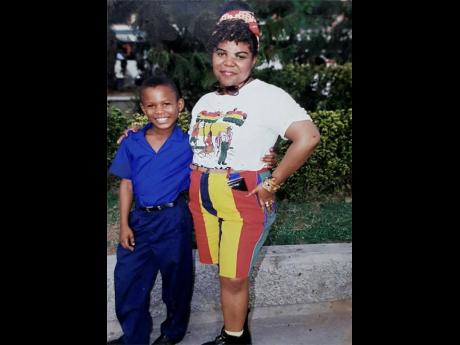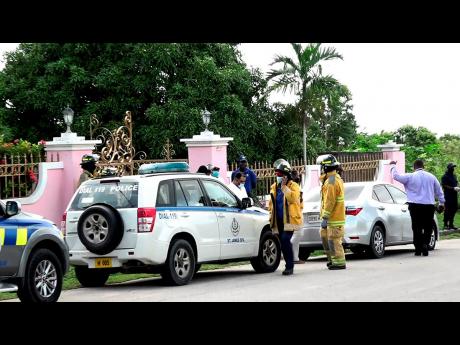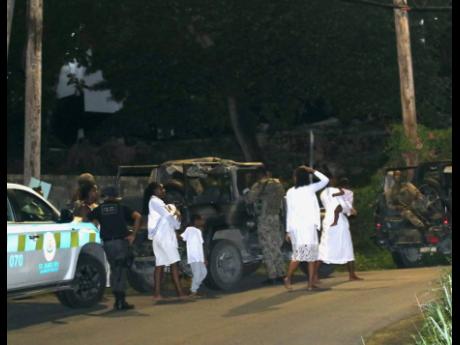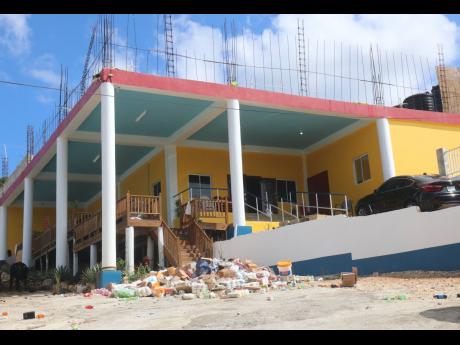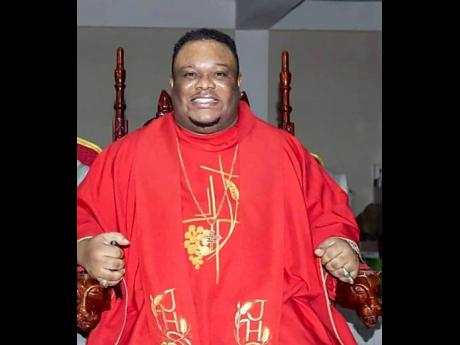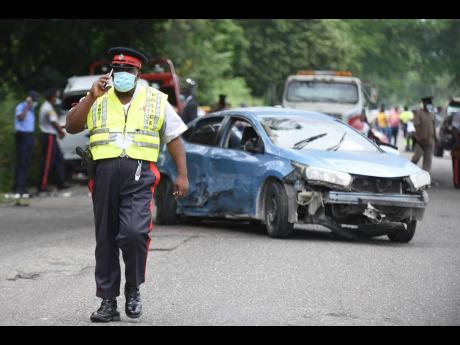Newsmaker of the Year: Kevin O. Smith
The body of Kevin Ontoneil Smith, the notorious charismatic religious leader whose name and death have become Jamaican tales, has reportedly been cremated with his family silent on whether the ashes have been interred. It’s the cap on the weeks of...
The body of Kevin Ontoneil Smith, the notorious charismatic religious leader whose name and death have become Jamaican tales, has reportedly been cremated with his family silent on whether the ashes have been interred.
It’s the cap on the weeks of drama, tragedy and shocking reports that have unfolded since news emerged on October 17, 2021 of a ritual at the St James-based Pathways International Kingdom Restoration Ministries, where three people died.
The gripping and tragic saga of how ‘His Excellency’ dislodged focus on a global pandemic has landed the late controversial bishop the title of Newsmaker for Year for 2021.
A reportedly ‘gifted’ man with a sex conviction, Smith was embraced by influential Jamaicans. He entered the classrooms of The University of the West Indies, Mona, and established a church in the Second City to lead a flock of more than 500.
Prior to October 17, 2021, there was little in the press about the man said to have training in technical psychotherapy and at least two unverified doctorate degrees.
Smith was born in Glengoffe, St Catherine, and migrated to Canada in 1993, three months after he started Jamaica College. An aunt has said he started his ministry in Canada, married and later divorced before establishing himself in Jamaica when he returned in 2011.
Management consultant Dr Henley Morgan has admitted opening doors for Smith to access the corridors of power locally in 2011 – the same year Smith established the Pathways International Foundation Limited, which included a mentorship programme and later his church on Albion Road.
Morgan said Smith, 39, showed “great prophetic powers”, was conscious about the “external show of success and influence”, and wanted to establish himself in Jamaica as a prophet, healer and evangelist, who would use Christianity to plot prosperity for believers.
To meet those aims, several events were held to pitch Smith’s vision, including a weeklong conference that Morgan said included people from most sectors of society.
“Among the things I did was putting on events and using some of my acceptance of people to cloak him in that so he would have ready acceptance among influential people in the society. I introduced him to a lot of people in the church ranks,” he added.
Smith’s mannerisms and approach to business did raise some concerns, although not enough to put a lid on the embrace.
“Some of us did notice some peculiar ways of raising funds and of self-elevation, especially in front of audiences. He was very conscious about who would get the praise and who would get the glory, … but that was overwhelmed by obvious manifestation of gifting,” Morgan said.
That orientation period ended after about 12 months and Morgan’s relationship with the young leader ended as Smith moved to St James leaving “a trail of pain and debt”.
Some businesspersons, who pooled resources to cover the costs of some of Smith’s early events and networking overtures and were expecting significant returns, have remained quiet about their involvement with the preacher.
Pictures with leaders such as former Prime Minister Portia Simpson Miller and entertainers have been used by the public as evidence of the man’s reach.
In St James, the violence-torn cradle of Jamaica’s tourism that’s also troubled by the stark divisions between the wealthy few and poor majority, little concerns surfaced of Smith’s pastoral work, which many considered well-meaning and ordinary behaviour.
Speaking mostly anonymously, many of the former church members credit their deceased shepherd for his welfare focus on the poor and downtrodden that dominated his congregation, even if they had to pay membership fees and suffer vulgar criticisms for attending church late or not paying for his varied services.
So captivating was Smith, the members say, that even the first salaries they received each year were dumped entirely into the coffers of Pathways International. Those funds contributed to the reported $1 million that Smith raked in per week based on his monetising of the church services and his supposed talents.
“Persons book an appointment and the price is US$50, and they would have discussions with him. For a spiritual encounter, or a deliverance session they paid US$350 each,”explained the former congregant, who described his time at the church as being “like slaves” under the alleged manipulation and tyranny of Smith.
“I was not allowed to go around my parents or any relatives or friends outside the church,” said the ex-member, who left the church in 2015.
It appears, now, those may have been stepping stones for the ominous call Smith made on October 13 for his members to prepare to board the ‘ark’ – a reference to his church – which he called the chosen to board on October 17.
“You cannot be of impure blood. You cannot come if you’ve taken the mark. If you come and you have taken the mark and you want to swear on the seal, you are going to fall down and die,” said Smith during a sermon on October 13. “It is only for those who are pure blood who have not taken the mark.”
That message was built on a sermon he preached the day before and was he widely believed to be referring to persons vaccinated against COVID-19 as impure.
The members obeyed their spiritual leader and turned up for church dressed in white.
At about 6 p.m. that day, Smith told them that before entering the church, they should bow down on their knees and that he would judge them and write their names in the “Lamb’s Book of Life”, according to witness accounts revealed by the Office of the Director of Public Prosecutions.
Smith also instructed them to cover their heads with something white, as he did not want anyone to look on his glory.
This service continued until about 1 a.m. on October 17.
But even with those words and the prophecy of death, members felt he was not speaking literally, so there was no thought of the bloodletting that was to come.
“I never dreamt that it was actually our leader who was going to be taking our lives through sacrifice,” one remorseful woman said of the events that unfolded on the evening of October 17.
“A number of the sisters were very happy and anxious to be among those who were to be cleansed, but we never knew that we were going to be murdered,” she added.
The bloody crescendo
What happened on October 17?
Smith allegedly arrived at the church in the company of now-deceased Kevaughn Plummer, 18, and a police officer. The pastor allegedly shouted that he was “God in the flesh”.
After that, Smith allegedly started issuing instructions for the throats of select members to be cut so they could enter the Kingdom.
In the end three people died – two were allegedly part of the sacrifice and the third, Plummer, was killed during a confrontation with the police who were called in after members reported what was happening.
Michael Brown, a worshipper, bled to death after Smith reportedly pulled the tubes attached to his body because of a kidney problem he was battling. The 38-year-old had discharged himself from hospital at the promise of Smith’s healing.
“You have to die, but you will rise again because I am the resurrection and the light,” Smith reportedly told the sick man.
Taneka Gardner, 39, was next.
After arriving at the church gate, she asked a little boy to assist her.
The little boy then said, “Pastor, she have luggage”.
Smith asked Gardner, “Is your blood clean?” and queried a health issue from which she was suffering at the time.
“Do you believe that I am the resurrection and the life?” Smith asked, to which Gardner reportedly answered, “Yes”.
“Do you believe I can raise you from the dead?” he asked further and she reportedly said, ‘Yes”.
“Your blood has to be cleansed. I will have to cut your throat,” and Gardner, for a third time, said, “Yes”, detailed the witness.
The witness reportedly refused to cut Gardner’s throat, after which murder-accused acolyte and ‘Archangel Gabriel’ Andre Ruddock allegedly used a knife to cut the woman’s throat.
It was later revealed that Gardner had started a process in 2019 to make Smith a beneficiary on her life insurance policies.
Shortly after Gardner’s killing, the worshippers began to flee the building and attempts were reportedly made to lock them inside.
The police were summoned and stormed the building and detained Smith, Ruddock and the other church members who were present, including about 15 children who had attended the bloody affair with their parents.
The nation was shocked as the details started to seep out, prompting questions as to how the situation was allowed to happen, whether the police were aware of any concerns and even calls for state regulation of churches.
But there was more drama and tragedy to come.
On October 25, a week after the incident, Smith perished in a car crash in Linstead, St Catherine, while being escorted to Kingston by cops for murder and firearm charges to be laid against him.
Twenty-six-year-old constable Orlando Irons, who was in the car with Smith, also died. Two other colleagues of his suffered serious injuries.
Ruddock was eventually charged with murder, while posthumous charges were also laid against Smith.
The police were questioned as to why they took the route they did given the Edward Seaga Highway, and whether all the protocols were followed to ensure Smith’s safe custody.
Assistant Commissioner of Police Gary McKenzie said last week the process was being reviewed by the inspectorate arm from whom an update remains outstanding.
“We provide transportation that is reliable, safe and we have adequate number of persons to ensure that prisoners that are transported are safe,” said McKenzie, who heads the police traffic branch. He said that what may appear to be the easiest route is just one of the factors used to determine how to move prisoners.
The smoke clears
A post-mortem was held on November 8 and it was confirmed that Smith died from multiple blunt-force trauma.
About two days later, Smith’s body was cremated in St James, The Sunday Gleaner has learned. Relatives and the authorities are tight-lipped about that development.
CEO of the Registrar General’s Department (RGD), Charlton McFarlane, said a request was made weeks ago for a death certificate, but he said that a burial can take place while that process is incomplete.
He explained that in cases of sudden and violent deaths, the police usually sign burial orders that permit the disposal of a person’s remains.
“All the paperwork that is being sorted out now is just to effect the registration where the record of his death comes into our official repository. Smith is not unique in this at all. Most violent deaths, persons don’t come to the RGD to effect the registration and to apply for a death certificate unless it is that there is some estate to be settled or there is some insurance claim,” he said.
The RGD typically issues burial orders for deaths of natural causes or ones the police indicate in writing they are not investigating.
A cloud of mystery now surrounds Smith’s multimillion-dollar estate.
Records show that Smith had properties at The Palms at Richmond in St Ann; a Gemstone Estates villa at Hatfield Meadows in Coral Gardens, St James; and a Dorchester Drive home in Ironshore, Montego Bay. He was also in the process of purchasing the 144 Albion Road property he had leased to build his church, but the property owner told The Sunday Gleaner that Smith had not completed making the payments.
Perhaps the most enduring debate post-Smith is what the Government should do to prevent a repeat of events like what happened at Pathways and the role of regulation.
“The police let us down. From my own investigations, there’s no question about that. The police ought to have been more vigilant,” argued Lloyd B. Smith, a publisher and former politician based in St James.
“We need to have a society in which there is a level of intelligence-gathering on any sort of entity that begins to look as if it will go in a direction that borders on what you may call fanaticism,” he said.
According to Lloyd B., who is not related to the late bishop, the church community should establish an “institutionalised entity” to carry out checks on their membership.
The Reverend Karl Johnson, first vice-president of the Baptist World Alliance and former general secretary of the Jamaica Baptist Union, has rejected the idea of regulation of the Church by the State.
“I would be the first churchman to vote against it, violently. In fact, I have heard that language and that view being issued by some of our [members] – our, meaning the wider church, not Baptist,” Johnson told The Gleaner’s A-Section current affairs podcast.
He said an accountability framework for churches should be developed and pursued by the religious community itself.

